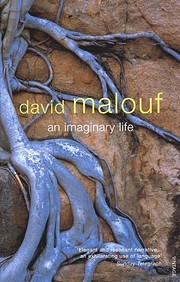

Pulse en una miniatura para ir a Google Books.
|
Cargando... An imaginary life (1978 original; edición 1999)por David Malouf
Información de la obraAn Imaginary Life por David Malouf (1978)
 Actualmente no hay Conversaciones sobre este libro.   ) )I don't know what I was expecting, but this is quite unusual. It starts out with the poet Ovid, having been exiled from Rome to the edge of the known world finding himself an unwilling guest of a people who don't speak the same language and who exist in a very different environment to that which he is used to. In chapter 1 he is full of self doubt and there is a cry from the heart of the poet asking if any of his work will survive him, if any of his lines will exist, even if in the quotations of others. We know that this is the case, hos work wasn't all destroyed and he has survived many centuries. Thereafter, he perks up a bit and we start to know more about the people he is living with, he starts to learn their language and to understand them, while remaining an outsider. As he begins to participate in the life of the village, so we learn more about them, but that also sparks memories in him of his earlier life, his childhood as the second son, his brother and his early death, the relationship with his father. We never quite find out what prompted his exile. And, somewhere along the way, he sees a wild boy, a human child living with the animals on the plain. He wonders how the child survives and determines to bring him back to the world of men. However this too brings a memory, when he was a child himself he seems to have had an invisible companion, and he can;t decide if the child is this invisible companion brought to life. It takes several seasons before the village combines to bring the boy in and Ovid takes over his care. The village remain sceptical and the events of the penultimate chapter, again, bring to the fore the doubt as to what this child actually is. Is he human, is he a devil, or might he be something else entirely? There's something supernatural about the close, when the narration has changed tone entirely from the first, no longer worrying about his writing or reputation, Ovid ventures out on one more journey and finds his place in the universe, while the spirit and physical worlds remain merged in an inseperable whole. I really had no idea what to expect of this from the brief synopsis, and I'm not sure how you go about describing it. There's something lyrical about the prose, something indefineable about the mingling of the physical and the imagined and something entirely enchanting about the care expressed by two such alien beings. I listened to this and really enjoyed it. sin reseñas | añadir una reseña
Pertenece a las series editorialesPremiosListas de sobresalientes
In the first century AD, Publius Ovidius Naso, the most urbane and irreverant poet of imperial Rome, was banished to a remote village on the edge of the Black Sea. From these sparse facts, one of our most distinguished novelists has fashioned an audacious and supremely moving work of fiction. Marooned on the edge of the known world, exiled from his native tongue, Ovid depends on the kindness of barbarians who impate their dead and converse with the spirit world. But then he becomes the guardian of a still more savage creature, a feral child who has grown up among deer. What ensues is a luminous encounter between civilisation and nature, as enacted by a poet who once catalogued the treacheries of love and a boy who slowly learns how to give it. No se han encontrado descripciones de biblioteca. |
Debates activosNingunoCubiertas populares
 Google Books — Cargando... Google Books — Cargando...GénerosSistema Decimal Melvil (DDC)823Literature English & Old English literatures English fictionClasificación de la Biblioteca del CongresoValoraciónPromedio: (3.93) (3.93)
¿Eres tú?Conviértete en un Autor de LibraryThing. |
||||||||||||||||||||||||||||||||||||||||||||||||||||||||||||||||||||||||||||||||||||||||||||||||||||||||||||||||||||||||||||||||||||||